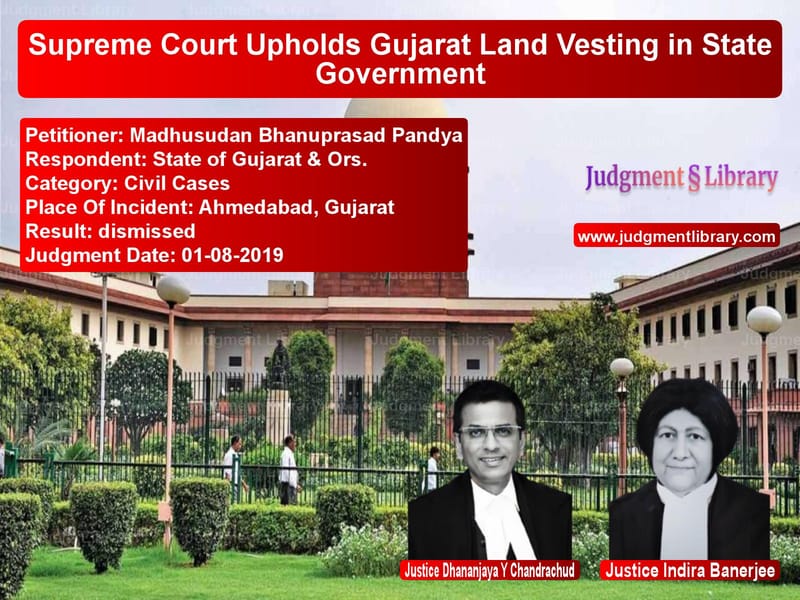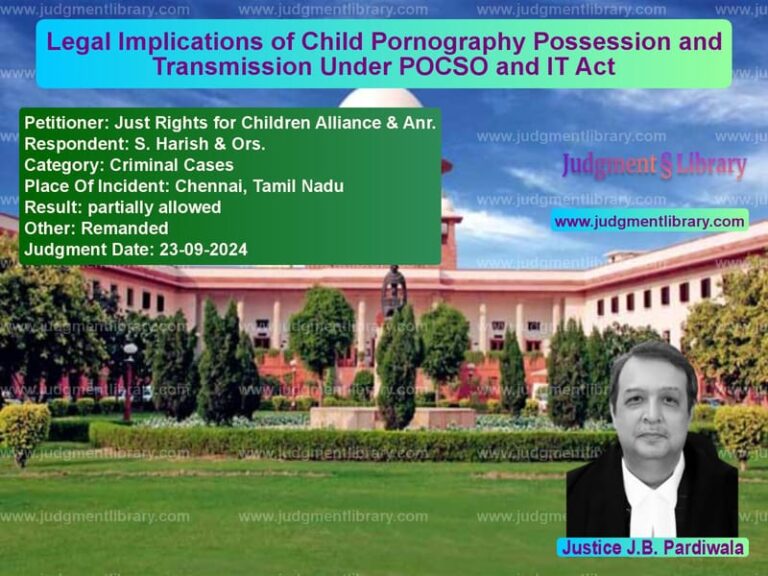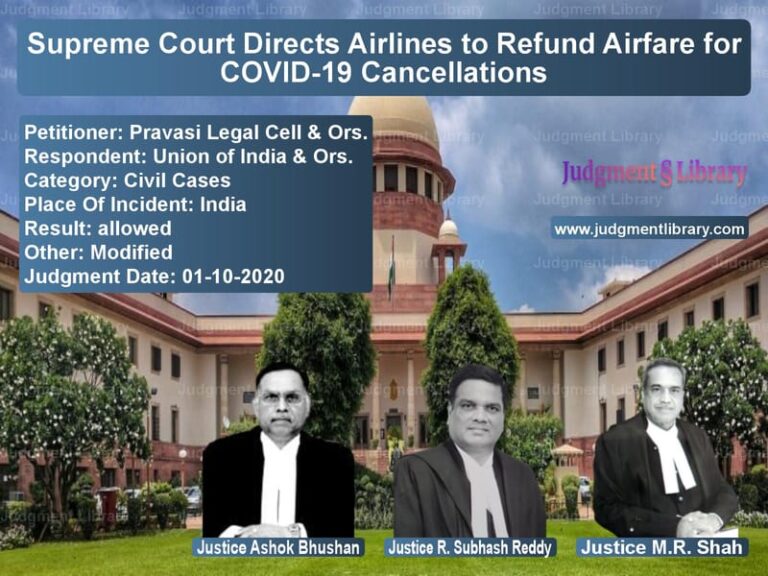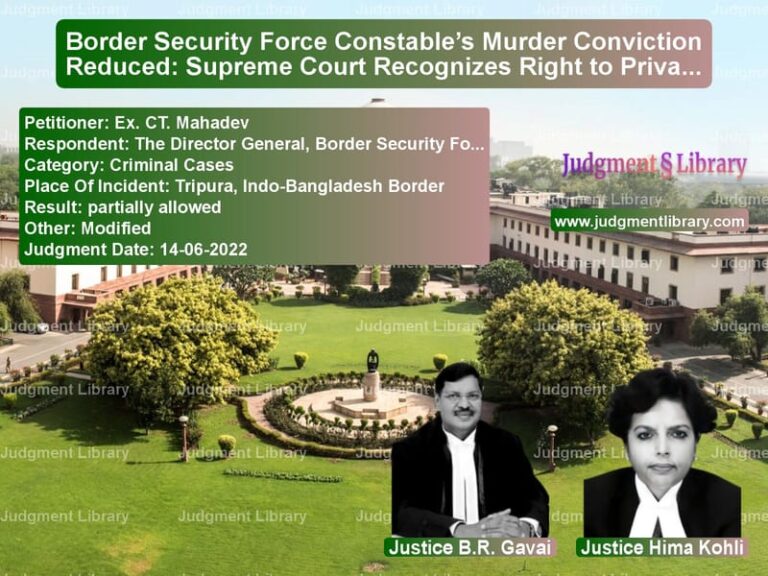Supreme Court Upholds Gujarat Land Vesting in State Government
The case of Madhusudan Bhanuprasad Pandya vs. State of Gujarat & Ors. revolves around a long-standing land dispute under the Urban Land (Ceiling and Regulation) Act, 1976. The Supreme Court, in its judgment dated 1st August 2019, upheld the Gujarat government’s decision to retain excess vacant land, dismissing the appellant’s claim for exemption. The ruling reinforced the principle that land already vested in the state cannot be reclaimed through belated legal challenges.
Background of the Case
The appellant, Madhusudan Bhanuprasad Pandya, claimed leasehold rights over Survey No. 288/4 in Chandlodia, Ahmedabad, measuring 5160 square meters. He had been running a cement pipe manufacturing business under M/s General Cement Pipe Company Limited. However, with the enactment of the Urban Land (Ceiling and Regulation) Act, 1976 (ULC Act), the state government classified 4160 square meters of this land as excess vacant land and initiated acquisition proceedings.
The legal journey involved multiple stages, including notices under Sections 8(1), 8(4), 9, and 10 of the ULC Act, culminating in a vesting notification dated 6th December 1986. A final possession notice was issued on 6th July 1990. However, the appellant challenged the process, citing procedural irregularities and the failure of authorities to consider his application for exemption under Section 20.
Key Issues in Dispute
- Whether the land was validly vested in the state under the Urban Land Ceiling Act.
- Whether the appellant’s application under Section 20 seeking exemption was legally maintainable.
- Whether the repeal of the Urban Land Ceiling Act in 1999 affected the vested land.
- Whether the possession taken by the state in 1990 was legally valid.
Arguments by the Petitioner (Madhusudan Bhanuprasad Pandya)
- The land in question was being used for industrial purposes and should have been exempted from acquisition.
- The authorities failed to follow due process before taking possession in 1990.
- The possession was taken in contravention of a status quo order issued by the Civil Court.
- The repeal of the ULC Act in 1999 should nullify the acquisition proceedings.
Arguments by the Respondents (State of Gujarat & Ors.)
- The land was classified as excess vacant land under the ULC Act following proper legal procedures.
- The possession was taken lawfully on 24th July 1990, with no legal challenge raised at the time.
- The repeal of the ULC Act in 1999 did not affect land that had already vested in the state government.
- The appellant did not challenge the vesting notification until much later, making the claim time-barred.
Supreme Court’s Observations
1. Land Legally Vested in the State
The Supreme Court emphasized that land acquisition under the ULC Act followed due process, and once vested in the state, it could not be reversed. The Court ruled:
“The entries in the record of rights, as published in 1963, are final and cannot be set aside after several decades. Allowing such claims would open the floodgates for endless litigation.”
2. Possession Was Taken in 1990
The Court examined whether the possession of the land had been legally taken by the state. It found that the state’s Panchnama (possession report) of 24th July 1990 was valid. The Court observed:
“The taking of possession was duly recorded in a Panchnama, and there is no evidence to suggest that the possession was not taken as claimed.”
3. The Civil Court’s Status Quo Order
The appellant argued that possession was taken despite a status quo order by the Civil Court. However, the Supreme Court noted:
“The Civil Court’s injunction applied to private parties and not the state government. The appellant’s own pleadings show that the competent authority was removed as a party to the suit.”
4. Effect of the ULC Act’s Repeal
The Court rejected the appellant’s claim that the repeal of the ULC Act in 1999 nullified the vesting of the land, holding:
“Under Section 3(1) of the Repealing Act, land that was already vested in the government before repeal remains unaffected.”
Final Verdict
- The Supreme Court dismissed the appeal.
- The 1990 possession of the land by the state was deemed valid.
- The exemption application under Section 20 was rejected.
- The repeal of the ULC Act in 1999 did not affect the already vested land.
Implications of the Judgment
- Reinforces that land once vested in the state cannot be reclaimed through delayed legal challenges.
- Clarifies that repeal of the ULC Act does not impact land already acquired under it.
- Prevents retrospective claims challenging settled land acquisitions.
- Provides certainty in urban land ceiling cases, ensuring stability in land records.
Conclusion
The Supreme Court’s ruling ensures that land acquisitions made under the Urban Land Ceiling Act remain legally binding despite its repeal. By upholding the state’s possession, the judgment protects government land from belated claims while reaffirming the importance of timely legal action in property disputes.
Petitioner Name: Madhusudan Bhanuprasad Pandya.Respondent Name: State of Gujarat & Ors..Judgment By: Justice Dhananjaya Y Chandrachud, Justice Indira Banerjee.Place Of Incident: Ahmedabad, Gujarat.Judgment Date: 01-08-2019.
Don’t miss out on the full details! Download the complete judgment in PDF format below and gain valuable insights instantly!
Download Judgment: Madhusudan Bhanupras vs State of Gujarat & O Supreme Court of India Judgment Dated 01-08-2019.pdf
Direct Downlaod Judgment: Direct downlaod this Judgment
See all petitions in Property Disputes
See all petitions in Landlord-Tenant Disputes
See all petitions in Judgment by Dhananjaya Y Chandrachud
See all petitions in Judgment by Indira Banerjee
See all petitions in dismissed
See all petitions in supreme court of India judgments August 2019
See all petitions in 2019 judgments
See all posts in Civil Cases Category
See all allowed petitions in Civil Cases Category
See all Dismissed petitions in Civil Cases Category
See all partially allowed petitions in Civil Cases Category







